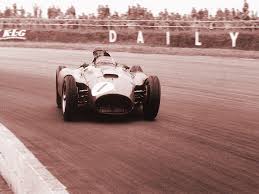Last week I brought out that if team orders had existed at Ferrari and Raikkonen allowed Vettel through, they could have won the Chinese GP. If team orders had existed at Red Bull, Ricciardo would have been allowed past Verstappen to be third on the podium.
However, team orders have existed in motor sport for decades. Some of the famous motor racing heroes have owed their world driver’s championship titles to team orders.
In 1956, Peter Collins was on the verge of becoming Britain’s first F1 World Champion when he handed his Lancia-Ferrari D50 over to team leader Juan Manuel Fangio, which resulted in Fangio winning the Drivers’ Championship that year. Team orders of an extreme type.

These days, mentioning ‘team orders’ in a group of western race enthusiasts will produce an instant response, with memories of Barrichello moving aside to let Michael Schumacher through to win in 2002, and then Schumacher inviting Barrichello to take the top step of the podium, to be later fined one million dollars for upsetting the order on the podium! The fine was not for the team orders.
In the 1997 Japanese Grand Prix there was a more sophisticated use of team orders, where Ferrari No 2 Eddie Irvine began the race light on fuel, allowing him to get ahead of the superior Williams-Renault cars and hold them up, to the benefit of Ferrari No 1 Michael Schumacher.
In 2007, Felipe Massa was guilty of allowing Kimi Raikkonen to overtake and win with team orders. Remember Red Bull telling Mark Webber not to overtake Sebastian Vettel at Silverstone.
These team orders caused an uproar, as if this were the first time that anything like this has ever happened. However, in the East there was barely a ripple. And there is a good reason why this is the case, and it has its roots in cultural diversity.
Look around the world and everywhere in the West there are uprisings. Many reasons for the protests, including religious, financial, territorial, political and so on. However, much has to do with the “rights” of the individual. People are fighting to do what they want, when they want, and how they want. Irrespective of what this might do to the people around them. It is a fairly selfish attitude that comes through.
The driver who benefits from the team orders, does so at the expense of the other driver. Personal freedom is being denied. And when personal freedom is denied in the West, you have all the makings for revolt. Harken back to Barrichello, Massa and Webber. The motoring media was in a frenzy, and it was put forward that the reason for the frenzy was because the FIA rules forbade the practice of team orders. This directive had come subsequently after the 2002 season, and read, “Team Orders that could influence the outcome of a race” were banned in F1 regulations.
However, this in turn brought out the inventive nature of human beings. Messages such as “Fernando is faster than you. Can you confirm you understand that message?” being given to Massa, obviously being an attempt at a “code”, but not a code of conduct! Even more secret codes began to be used. Instructions to turn down engines, or to save fuel became the way to continue the practice of team orders.
So what could be done about it? Was there a way the Federation Internationale de l’Automobile (FIA) could police this? The simple answer was again, no. The FIA, an organization that has rarely covered itself in glory, then responded by lifting the ban on team orders. There, that should fix it. But it hasn’t and didn’t, simply because of the sanctity of the rights of the individual human beings, which is held very high in the West. “Team orders” is considered a form of cheating, and every society frowns on cheating.
But what about the mystic East? Ah, things are quite different here. The family unit is close-knit and based on seniority. There is an acceptance of one’s “place” in the family structure. If the nominally ‘superior’ person tells you to jump, the response is never “Why?” but rather “How high?”
That familial model then becomes integrated in the societal one. Seniority is known, understood and adhered to. Even in such mundane situations as who pays at the restaurant, the most senior picks up the tab. There is no such thing as “going Dutch” in Asia, as there is in Holland.
Bringing that style of behavior to the race track produces no angst if driver B is told that driver A is faster than he is. Through the principles of seniority, driver B will automatically cede his position. And what is more, the Asian media would consider this normal, logical and honorable and make no comment.
So, should we ban team orders again? Or just learn to live with it? The answer is not difficult. The policing of a ban on team orders is really quite impossible to do. There will always be ways around the problem, so the motor racing fraternity should just continue, as it has done for decades, allowing the team to decide just who finishes where. And the drivers should take on board a little of the Asian ways.




